必修一 Unit 3 Travel journal-Learning about language课件(共37张PPT)
文档属性
| 名称 | 必修一 Unit 3 Travel journal-Learning about language课件(共37张PPT) |
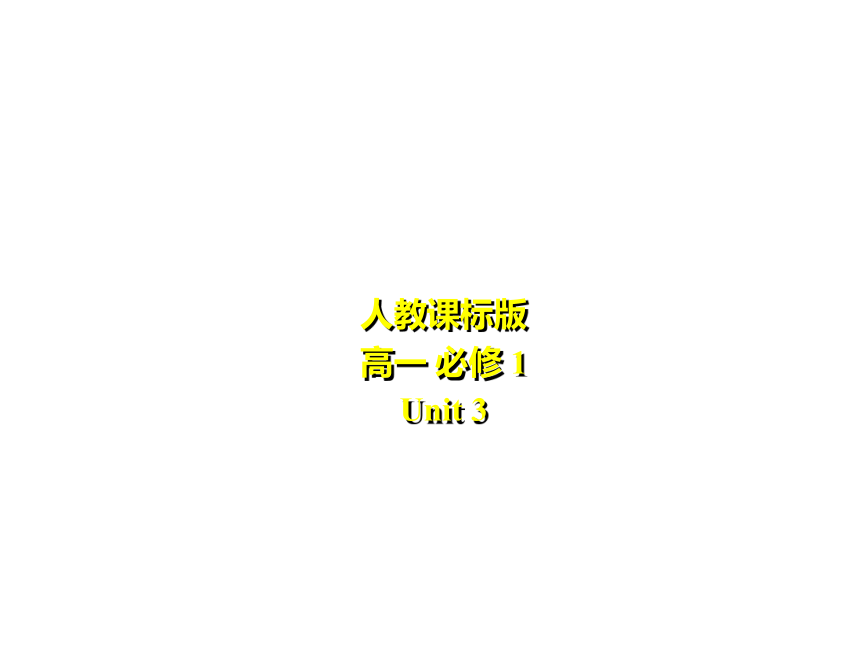
|
|
| 格式 | zip | ||
| 文件大小 | 456.8KB | ||
| 资源类型 | 教案 | ||
| 版本资源 | 人教版(新课程标准) | ||
| 科目 | 英语 | ||
| 更新时间 | 2017-12-24 00:00:00 | ||
图片预览

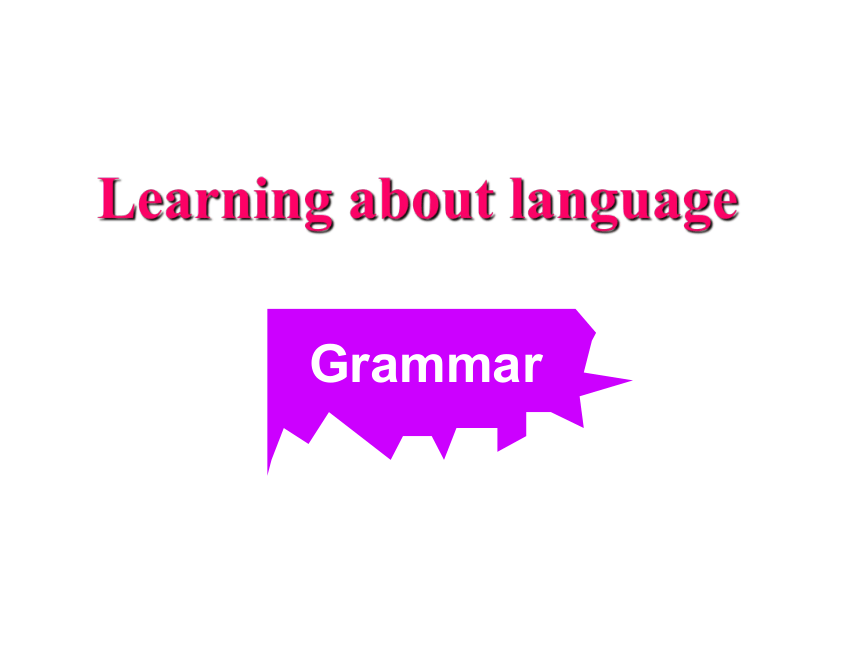
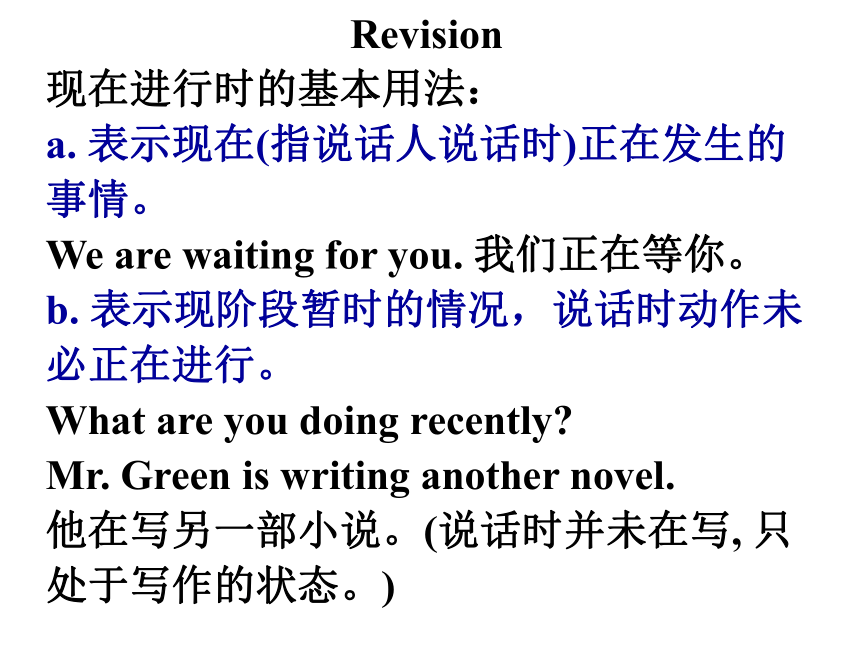
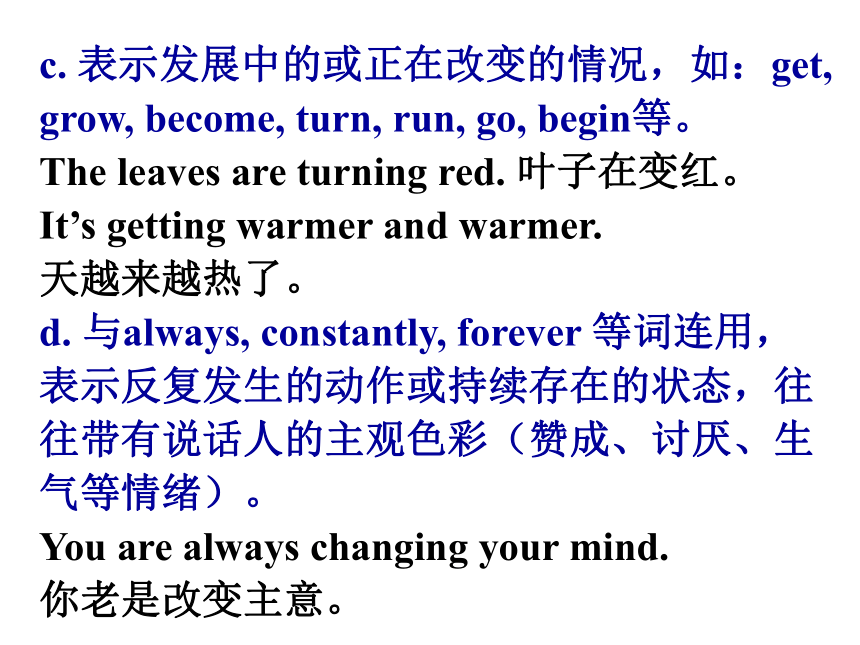

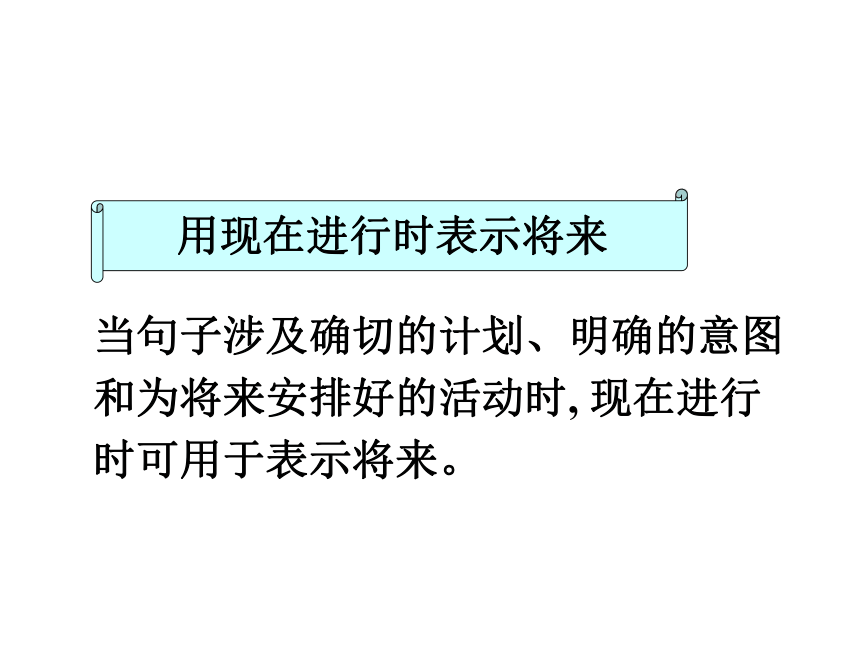
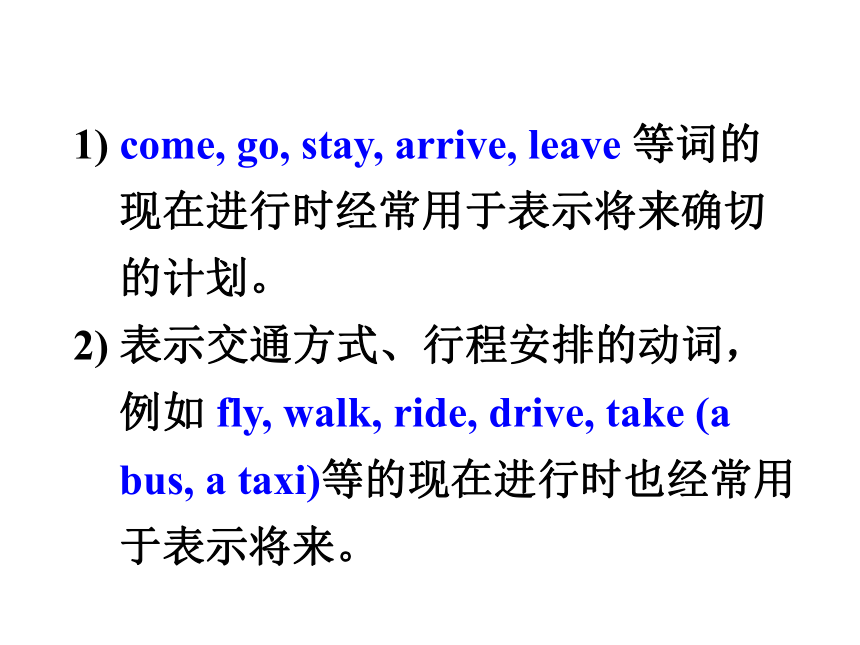
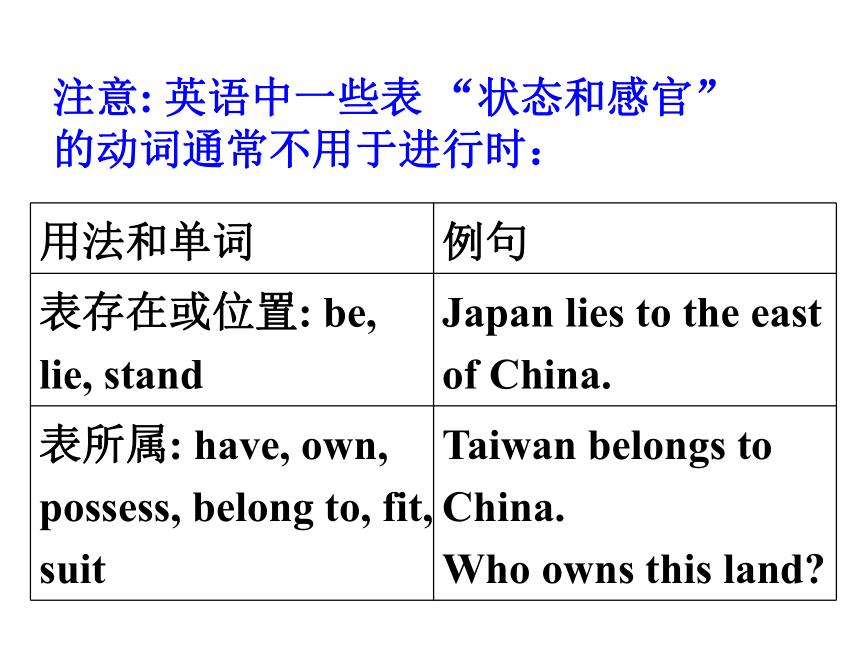

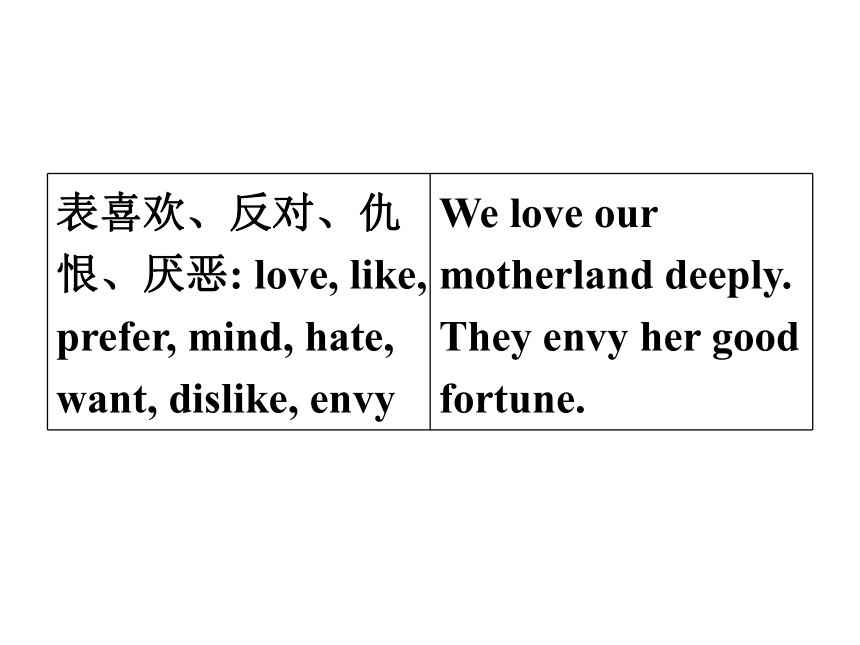
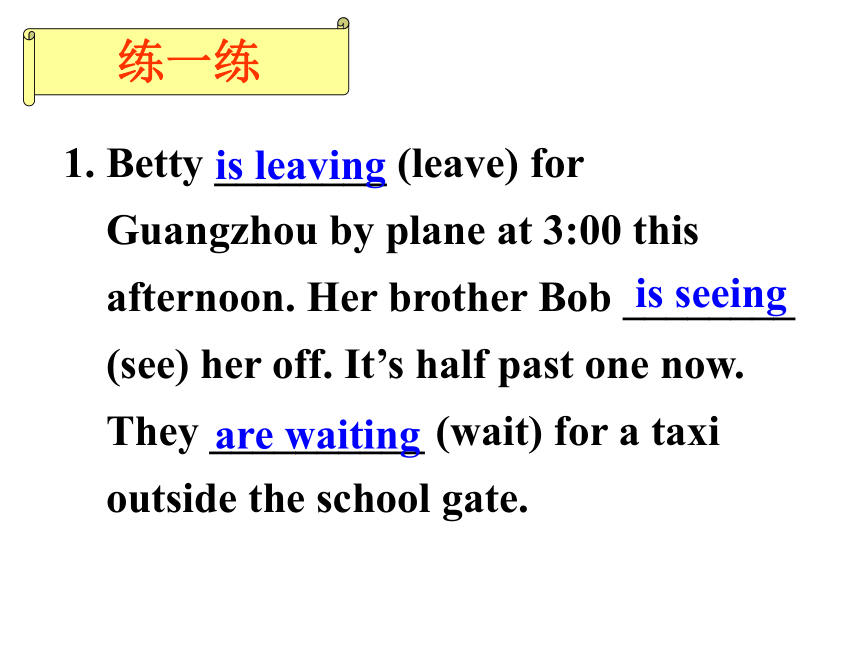
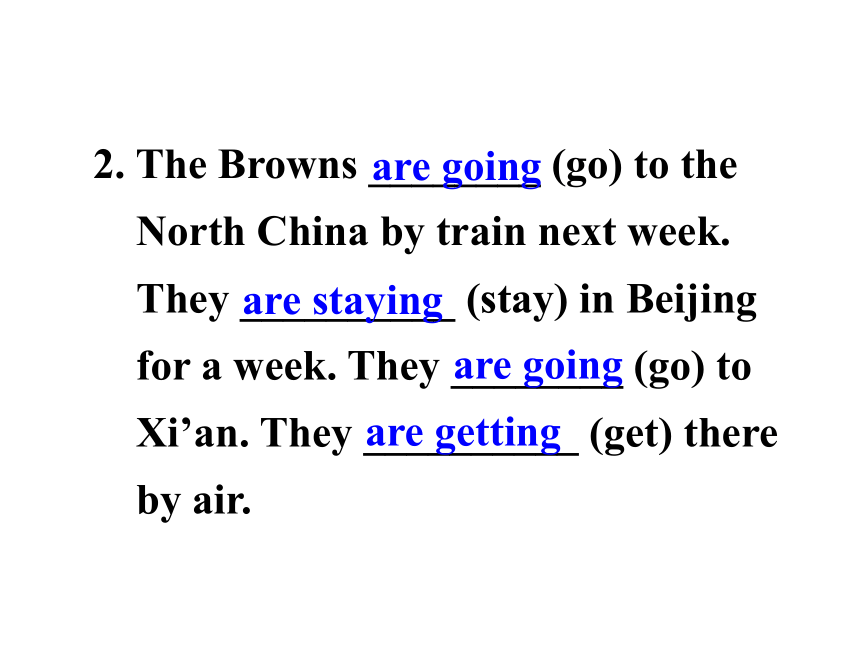
文档简介
课件37张PPT。人教课标版
高一 必修 1
Unit 3Learning about languageRevision
现在进行时的基本用法:
a. 表示现在(指说话人说话时)正在发生的事情。
We are waiting for you. 我们正在等你。
b. 表示现阶段暂时的情况,说话时动作未必正在进行。
What are you doing recently?
Mr. Green is writing another novel.
他在写另一部小说。(说话时并未在写, 只处于写作的状态。)c. 表示发展中的或正在改变的情况,如:get, grow, become, turn, run, go, begin等。
The leaves are turning red. 叶子在变红。
It’s getting warmer and warmer.
天越来越热了。
d. 与always, constantly, forever 等词连用,表示反复发生的动作或持续存在的状态,往往带有说话人的主观色彩(赞成、讨厌、生气等情绪)。
You are always changing your mind.
你老是改变主意。现在进行时除了表示正在进行等目前的或暂时的情况外,还可以表示将来时态。用现在进行时表示将来当句子涉及确切的计划、明确的意图和为将来安排好的活动时, 现在进行时可用于表示将来。1) come, go, stay, arrive, leave 等词的现在进行时经常用于表示将来确切的计划。
2) 表示交通方式、行程安排的动词,例如 fly, walk, ride, drive, take (a bus, a taxi)等的现在进行时也经常用于表示将来。注意: 英语中一些表 “状态和感官”的动词通常不用于进行时:Betty ________ (leave) for Guangzhou by plane at 3:00 this afternoon. Her brother Bob ________ (see) her off. It’s half past one now. They __________ (wait) for a taxi outside the school gate.is leavingis seeingare waiting练一练2. The Browns ________ (go) to the North China by train next week. They __________ (stay) in Beijing for a week. They ________ (go) to Xi’an. They __________ (get) there by air.are going are stayingare goingare getting3. Some friends _________ (come) to Anne’s birthday party this evening. Anne’s mother __ (be) busy ______ (get) ready for the birthday dinner. Anne _________ (help) her mother now. are comingisgettingis helping另外, 表示将来的动作或状态, 还可用以下几种形式:注意!① will / shall+动词原形
I shall be seventeen years old next month.② be going to+动词原形:表示即将发生的或最近打算进行的事。
We are going to have a meeting today.be going to 和will都可以表示将来,但前者侧重指说话之前就决定要做某事,而后者指说话时做出的决定。 ③ be to+动词原形:表示按计划要发生的事或征求对方意见。
Are we to go on with this work?
④ be about to+动词原形,表示即将发生的动作,不与表示将来的时间状语连用。 I was about to go swimming when my guide shouted at me and told me not to do so. 我正要去游泳, 这时向导大声叫我不要去。⑤ be +动词的ing形式:表示按计划或安排要发生的事, 含义是 “预定要……” 这一结构常用趋向动词 go, arrive, come, leave, start, stay, return和play, do, have, work, wear, spend, see, meet等 。 --- When are you going off for your holiday? 你什么时候动身去度假?
--- My plane is taking off at 9:20, so I must be at the airport by 8:30. 我乘坐的飞机将于9:20分起飞, 所以我必须在8:30之前赶到机场。⑥ 一般现在时表示将来时
(1) 按规定预计要发生的未来动作,仅限于动词come, go, leave, move, start, return, arrive, begin, stay等动词。
The plane takes off at 10:10. That is, it’s leaving in ten minutes.(2) 用在状语从句中用一般现在时代替将来时。
If you do that again, I’ll hit you.
(3) 用在I bet 和I hope后面, 常用一般现在时表将来。
I bet you don’t get up before ten tomorrow. 我敢说你明天不到10点是不会起床的。⑦ 单纯叙述未来的事实, 可以用将来进行时, 也可表示按计划安排将来要执行的动作。 实例: At this time tomorrow ____ over the Atlantic. (2003北京) A. we’re going to fly B. we’ll be flying C. we’ll fly D. we’re to fly1. ---Did you write to Grace last summer?
---No, but I’ll ______ her over
Christmas vacation.
A. be seen B. have seen
C. be seeing D. to see 练一练!2. ---I’m going to the States?
---How long ___ you ___ in the States?
A. are; stayed B. are; staying C. have; stayed D. did; stay
3. I’ve won a holiday for two weeks to Florida. I ____ my mum.
A. am taking B. have taken
C. take D. will have taken 4. Selecting a mobile phone for personal use is no easy task because technology ____ so rapidly.
will change
B. has changed
C. will have changed
D. is changing 5. --- You’ve left the light on.
--- Oh, I have. ___ and turn it off.
I go B. I’ve gone
C. I’ll go D. I’m going
6. --- Is this raincoat yours?
--- No, mine ____ there behind the door.
A. is hanging B. has hung
C. hangs D. hung 7. --- What’s that terrible noise?
---The neighbours ____ for a party.
have prepared
are preparing
C. prepare
D. will prepare 8. Because the shop ____, all the T-shirts are sold at half prices.
has closed down
closed down
is closing down
had closed down9. --- Can I join the club, Dad?
--- You can when you ___ a bit old.
get B. will get
C. are getting D. will have got
10. I feel it is your husband who ___ for the spoiled child.
A. is to blame B. is going to blame
C. is to be blamed D. should blame11. At this time tomorrow, ____ over the Atlantic.
we’re going to fly
B. we’ll be flying
C. we’ll fly
D. we’re to fly12. ---Are you still busy?
--- Yes, I ___ my work, and it won’t take long.
just finish
am just finishing
have just finished
am just going to finish13. ---Did you tell Julia about the result?
--- Oh, no, I forgot. I ____ her now.
A. will be calling
B. will call
C. call
D. am to call14. --- What are you going to do this afternoon?
--- I’m going to the cinema with some friends. The film ___ quite early, so we ___ to the bookstore after that.
A. finished; are going
B. finished; go
C. finishes; are going
D. finishes; go15. ----Have you moved into the new
house?
----Not yet. The rooms ___.
A. are being painting
B. are painting
C. are painted
D. are being painted16. --- do you like the material?
--- Yes, it ____ very soft.
A. is feeling
B. felt
C. feels
D. is felt17. I don’t really work here; I ___
until the new secretary arrives.
A. just help out
B. have just helped out
C. am just helping out
D. will just help out
高一 必修 1
Unit 3Learning about languageRevision
现在进行时的基本用法:
a. 表示现在(指说话人说话时)正在发生的事情。
We are waiting for you. 我们正在等你。
b. 表示现阶段暂时的情况,说话时动作未必正在进行。
What are you doing recently?
Mr. Green is writing another novel.
他在写另一部小说。(说话时并未在写, 只处于写作的状态。)c. 表示发展中的或正在改变的情况,如:get, grow, become, turn, run, go, begin等。
The leaves are turning red. 叶子在变红。
It’s getting warmer and warmer.
天越来越热了。
d. 与always, constantly, forever 等词连用,表示反复发生的动作或持续存在的状态,往往带有说话人的主观色彩(赞成、讨厌、生气等情绪)。
You are always changing your mind.
你老是改变主意。现在进行时除了表示正在进行等目前的或暂时的情况外,还可以表示将来时态。用现在进行时表示将来当句子涉及确切的计划、明确的意图和为将来安排好的活动时, 现在进行时可用于表示将来。1) come, go, stay, arrive, leave 等词的现在进行时经常用于表示将来确切的计划。
2) 表示交通方式、行程安排的动词,例如 fly, walk, ride, drive, take (a bus, a taxi)等的现在进行时也经常用于表示将来。注意: 英语中一些表 “状态和感官”的动词通常不用于进行时:Betty ________ (leave) for Guangzhou by plane at 3:00 this afternoon. Her brother Bob ________ (see) her off. It’s half past one now. They __________ (wait) for a taxi outside the school gate.is leavingis seeingare waiting练一练2. The Browns ________ (go) to the North China by train next week. They __________ (stay) in Beijing for a week. They ________ (go) to Xi’an. They __________ (get) there by air.are going are stayingare goingare getting3. Some friends _________ (come) to Anne’s birthday party this evening. Anne’s mother __ (be) busy ______ (get) ready for the birthday dinner. Anne _________ (help) her mother now. are comingisgettingis helping另外, 表示将来的动作或状态, 还可用以下几种形式:注意!① will / shall+动词原形
I shall be seventeen years old next month.② be going to+动词原形:表示即将发生的或最近打算进行的事。
We are going to have a meeting today.be going to 和will都可以表示将来,但前者侧重指说话之前就决定要做某事,而后者指说话时做出的决定。 ③ be to+动词原形:表示按计划要发生的事或征求对方意见。
Are we to go on with this work?
④ be about to+动词原形,表示即将发生的动作,不与表示将来的时间状语连用。 I was about to go swimming when my guide shouted at me and told me not to do so. 我正要去游泳, 这时向导大声叫我不要去。⑤ be +动词的ing形式:表示按计划或安排要发生的事, 含义是 “预定要……” 这一结构常用趋向动词 go, arrive, come, leave, start, stay, return和play, do, have, work, wear, spend, see, meet等 。 --- When are you going off for your holiday? 你什么时候动身去度假?
--- My plane is taking off at 9:20, so I must be at the airport by 8:30. 我乘坐的飞机将于9:20分起飞, 所以我必须在8:30之前赶到机场。⑥ 一般现在时表示将来时
(1) 按规定预计要发生的未来动作,仅限于动词come, go, leave, move, start, return, arrive, begin, stay等动词。
The plane takes off at 10:10. That is, it’s leaving in ten minutes.(2) 用在状语从句中用一般现在时代替将来时。
If you do that again, I’ll hit you.
(3) 用在I bet 和I hope后面, 常用一般现在时表将来。
I bet you don’t get up before ten tomorrow. 我敢说你明天不到10点是不会起床的。⑦ 单纯叙述未来的事实, 可以用将来进行时, 也可表示按计划安排将来要执行的动作。 实例: At this time tomorrow ____ over the Atlantic. (2003北京) A. we’re going to fly B. we’ll be flying C. we’ll fly D. we’re to fly1. ---Did you write to Grace last summer?
---No, but I’ll ______ her over
Christmas vacation.
A. be seen B. have seen
C. be seeing D. to see 练一练!2. ---I’m going to the States?
---How long ___ you ___ in the States?
A. are; stayed B. are; staying C. have; stayed D. did; stay
3. I’ve won a holiday for two weeks to Florida. I ____ my mum.
A. am taking B. have taken
C. take D. will have taken 4. Selecting a mobile phone for personal use is no easy task because technology ____ so rapidly.
will change
B. has changed
C. will have changed
D. is changing 5. --- You’ve left the light on.
--- Oh, I have. ___ and turn it off.
I go B. I’ve gone
C. I’ll go D. I’m going
6. --- Is this raincoat yours?
--- No, mine ____ there behind the door.
A. is hanging B. has hung
C. hangs D. hung 7. --- What’s that terrible noise?
---The neighbours ____ for a party.
have prepared
are preparing
C. prepare
D. will prepare 8. Because the shop ____, all the T-shirts are sold at half prices.
has closed down
closed down
is closing down
had closed down9. --- Can I join the club, Dad?
--- You can when you ___ a bit old.
get B. will get
C. are getting D. will have got
10. I feel it is your husband who ___ for the spoiled child.
A. is to blame B. is going to blame
C. is to be blamed D. should blame11. At this time tomorrow, ____ over the Atlantic.
we’re going to fly
B. we’ll be flying
C. we’ll fly
D. we’re to fly12. ---Are you still busy?
--- Yes, I ___ my work, and it won’t take long.
just finish
am just finishing
have just finished
am just going to finish13. ---Did you tell Julia about the result?
--- Oh, no, I forgot. I ____ her now.
A. will be calling
B. will call
C. call
D. am to call14. --- What are you going to do this afternoon?
--- I’m going to the cinema with some friends. The film ___ quite early, so we ___ to the bookstore after that.
A. finished; are going
B. finished; go
C. finishes; are going
D. finishes; go15. ----Have you moved into the new
house?
----Not yet. The rooms ___.
A. are being painting
B. are painting
C. are painted
D. are being painted16. --- do you like the material?
--- Yes, it ____ very soft.
A. is feeling
B. felt
C. feels
D. is felt17. I don’t really work here; I ___
until the new secretary arrives.
A. just help out
B. have just helped out
C. am just helping out
D. will just help out
